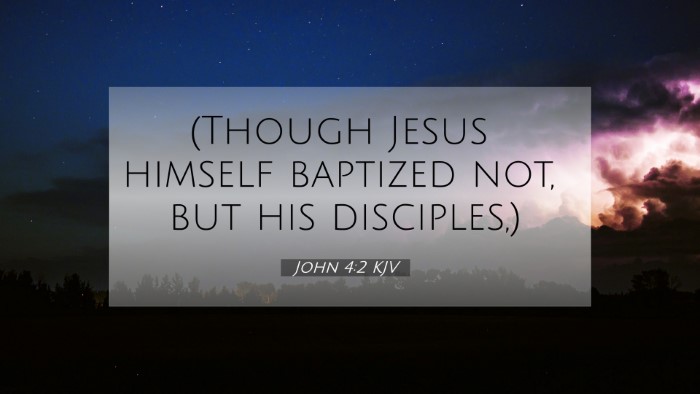Understanding John 4:2
John 4:2 states: "Though Jesus himself did not baptize, but only his disciples." This verse provides an important insight into the ministry of Jesus and the role of baptism during His earthly ministry.
Context and Implications
This verse occurs within the narrative of Jesus' encounter with the Samaritan woman at the well. It highlights that while Jesus was a leading figure in the ministry, the actual act of baptizing was performed by His disciples. This distinction can serve several interpretive purposes:
- Authority and Mission: By not baptizing Himself, Jesus emphasizes that His role was that of a teacher and prophet, pointing towards the importance of His message rather than the ritual itself.
- Discipleship: This verse illustrates the process of discipleship, as the disciples are entrusted with tasks that reflect the teachings of Jesus, promoting their growth and preparation for ministry.
- Clarification of Practices: The early church often faced the dilemma of distinguishing between various baptism practices. This verse sets a precedent for understanding that the importance lies in faith and the message rather than the act alone.
Key Insights from Public Domain Commentaries
Commentaries by Matthew Henry, Albert Barnes, and Adam Clarke provide additional insights into this verse:
- Matthew Henry: He emphasizes that Jesus’ ministry was about preaching the Gospel and not merely performing rituals. Henry argues that the significance of baptism lies in its relation to one's faith and the following of Christ.
- Albert Barnes: Barnes suggests that while Jesus did not engage in baptism Himself, His approval and support of it were evident. This highlights the importance of the disciples’ role in carrying forth the mission of Jesus.
- Adam Clarke: Clarke mentions that this verse clarifies that Jesus came not to cause divisions through baptism but to unite believers through faith. His focus remained on the spiritual transformation rather than ceremonial practices.
Bible Verse Cross-References
To fully grasp the implications of John 4:2, we can identify several cross-references:
- Matthew 28:19 - The Great Commission emphasizes the importance of baptism as part of making disciples.
- Acts 2:38 - Peter's call for repentance and baptism showcases the role of baptism in response to the Gospel.
- 1 Corinthians 1:14-17 - Paul discusses the significance of baptism and his lack of emphasis on performing it, resonating with the principle found in John 4:2.
- John 3:22 - This verse highlights that Jesus' disciples were baptizing, affirming their active role in the ministry.
- John 1:33 - John the Baptist recognizes the distinction between his baptism and Jesus' ministry, reinforcing the theme of preparation for the Messiah.
- Mark 16:16 - This speaks to the necessity of belief and the act of baptism for salvation.
- Romans 6:4 - Paul explains that baptism signifies the believer's identification with Christ's death and resurrection.
- Acts 19:3-5 - These verses demonstrate the understanding of baptism in the early church and its relation to faith in Jesus.
Thematic Connections and Comparative Analysis
This verse can be linked to various themes throughout the Bible:
- Faith Over Ritual: Throughout scripture, the emphasis often lies on internal faith rather than merely external practices. This can be seen in 1 Samuel 16:7 and Galatians 5:6.
- The Role of Disciples: The responsibility and commissioning of disciples is a recurring theme in the Gospels (Matthew 10:1; Luke 9:1).
- Jesus’ Ministry Purpose: The purpose of Christ’s ministry is consistently about transformation and redemption (Luke 19:10; John 10:10).
Conclusion
John 4:2 reflects the significance of understanding the broader context of Jesus’ ministry and the role of His disciples in carrying forth the message of the Gospel. By using cross-references and thematic connections, believers can engage in a deeper study of the Scriptures, reinforcing the essential nature of faith and the mission of Jesus.




